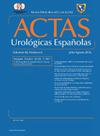携带DNA损伤反应(DDR)途径生殖细胞突变的健康男性前列腺癌的早期诊断。文献审查和拟议议定书
IF 1.2
4区 医学
Q3 UROLOGY & NEPHROLOGY
引用次数: 0
摘要
与普通人群相比,DNA损伤反应(DDR)途径突变的男性患前列腺瘤的风险更高。研究得最好的改变是BRCA1/2、ATM和mmr的突变。材料和方法回顾了DDR通路突变的临床和预后意义,以及对受影响患者可用的不同筛查策略的评估。目的探讨男性DDR通路突变的早期诊断策略。结果目前的指南没有为这一人群提供明确、具体的建议。在MMR通路的突变中,种系MSH2突变与前列腺癌的关系最为密切。携带BRCA1/2、ATM和MSH2种系突变的男性患前列腺瘤的几率更高,更容易在年轻时发病,并且更有可能出现侵袭性疾病。此外,与普通人群相比,携带BRCA1/2突变的男性癌症特异性生存率较低。在这些患者中,PSA水平在检测前列腺癌方面有重要的局限性。前列腺多参数MRI可能比定期PSA检测更有效。结论DDR通路突变的患者发生侵袭性前列腺肿瘤的风险增加,需要更早、更强化的筛查。基于psa的筛查有明显的局限性。结合多参数MRI的筛查策略可以为该患者组提供更有效的策略。本文章由计算机程序翻译,如有差异,请以英文原文为准。
Diagnóstico precoz del cáncer de próstata en los varones sanos portadores de mutaciones germinales en las vías de respuesta al daño del ADN (vías DNA Damage Response [DDR]). Revisión de la literatura y propuesta de protocolo
Introduction
Men with mutations in DNA damage response (DDR) pathways have a higher risk of developing prostate neoplasia compared to the general population. The best studied alterations are mutations in BRCA1/2, ATM and MMR-Lynch s.
Material and methods
A review of the clinical and prognostic implications of mutations in DDR pathways, as well as an evaluation of the different screening strategies available for affected patients.
Objective
To propose an early diagnostic strategy for men with mutations in DDR pathways.
Results
Current guidelines do not provide clear, specific recommendations for this subgroup of men. Among mutations in the MMR pathway, the germline MSH2 mutation is most strongly associated with prostate cancer. Men with germline mutations in BRCA1/2, ATM, and MSH2 have a higher incidence of prostate neoplasia, tend to develop the disease at a younger age, and are more likely to have aggressive forms of the disease. Furthermore, men with BRCA1/2 mutations have a lower cancer-specific survival rate compared to the general population. In these patients, PSA levels have important limitations in detecting prostate cancer. Multiparametric MRI of the prostate may be more effective than periodic PSA testing.
Conclusions
Patients with mutations in DDR pathways are at increased risk for aggressive prostate neoplasms and require earlier and more intensive screening. PSA-based screening has notable limitations. A screening strategy incorporating multiparametric MRI could offer a more effective strategy for this patient group.
求助全文
通过发布文献求助,成功后即可免费获取论文全文。
去求助
来源期刊

Actas urologicas espanolas
UROLOGY & NEPHROLOGY-
CiteScore
1.90
自引率
0.00%
发文量
98
审稿时长
46 days
期刊介绍:
Actas Urológicas Españolas is an international journal dedicated to urological diseases and renal transplant. It has been the official publication of the Spanish Urology Association since 1974 and of the American Urology Confederation since 2008. Its articles cover all aspects related to urology.
Actas Urológicas Españolas, governed by the peer review system (double blinded), is published online in Spanish and English. Consequently, manuscripts may be sent in Spanish or English and bidirectional free cost translation will be provided.
 求助内容:
求助内容: 应助结果提醒方式:
应助结果提醒方式:


